- Home
- George Orwell
Nineteen Eighty-Four
Nineteen Eighty-Four Read online
PENGUIN BOOKS
Nineteen Eighty-Four
'One of the most influential English writers of the twentieth century' Robert McCrum, Observer
'A prophet who thought the unthinkable and spoke the unspeakable, even when it offended conventional thought' Peter Grosvenor, Daily Express
'He saw through everything because he could also see through himself. Many writers and journalists have tried to imitate his particular kind of clarity without possessing anything like his moral authority' Peter Ackroyd, The Times
'Orwell's innocent eye was often devastatingly perceptive ... a man who looked at his world with wonder and wrote down exactly what he saw, in admirable prose' John Mortimer, Evening Standard
'Matchlessly sharp and fresh ... The clearest and most compelling English prose style this century' John Carey, Sunday Times
'The great moral force of his age ... It is impossible not to be elated by his literary and political writing - and enraged by what he was up against ... the most lovable of writers, someone whose books can make the reader long for his company' Geoffrey Wheatcroft, Spectator
'The finest English essayist of his century ... He made it his business to tell the truth at a time when many contemporaries believed that history had ordained the lie ... His work endures, as lucid and vigorous as the day it was written' Paul Gray, Time
ERIC ARTHUR BLAIR (George Orwell) was born in 1903 in India, where his father worked for the Civil Service. The family moved to England in 1907 and in 1917 Orwell entered Eton, where he contributed regularly to the various college magazines. From 1922 to 1927 he served with the Indian Imperial Police in Burma, an experience that inspired his first novel, Burmese Days (1934). Several years of poverty followed. He lived in Paris for two years before returning to England, where he worked successively as a private tutor, schoolteacher and bookshop assistant, and contributed reviews and articles to a number of periodicals. Down and Out in Paris and London was published in 1933. In 1936 he was commissioned by Victor Gollancz to visit areas of mass unemployment in Lancashire and Yorkshire, and The Road to Wigan Pier (1937) is a powerful description of the poverty he saw there. At the end of 1936 Orwell went to Spain to fight for the Republicans and was wounded. Homage to Catalonia is his account of the civil war. He was admitted to a sanatorium in 1938 and from then on was never fully fit. He spent six months in Morocco and there wrote Coming Up for Air. During the Second World War he served in the Home Guard and worked for the BBC Eastern Service from 1941 to 1943. As literary editor of Tribune he contributed a regular page of political and literary commentary, and he also wrote for the Observer and later the Manchester Evening News. His unique political allegory, Animal Farm, was published in 1945, and it was this novel, together with Nineteen Eighty-Four (1949), which brought him world-wide fame.
George Orwell died in London in January 1950. A few days before, Desmond MacCarthy had sent him a message of greeting in which he wrote: 'You have made an indelible mark on English literature ... you are among the few memorable writers of your generation.'
THOMAS PYNCHON is the author of V, The Crying of Lot 49, Gravity's Rainbow, Vineland, Slow Learner and Mason & Dixon.
George Orwell
Nineteen Eighty-Four
Introduction by Thomas Pynchon
PENGUIN BOOKS
Published by the Penguin Group
Penguin Books Ltd, 80 Strand, London WC2R 0RL, England Penguin Putnam Inc., 375 Hudson Street, New York, New York 10014, USA Penguin Books Australia Ltd, 250 Camberwell Road, Camberwell, Victoria 3124, Australia Penguin Books Canada Ltd, 10 Alcorn Avenue, Toronto, Ontario, Canada M4V 3B2
Penguin Books India (P) Ltd, 11 Community Centre, Panchsheel Park, New Delhi - 110 017, India Penguin Books (NZ) Ltd, Cnr Rosedale and Airborne Roads, Albany, Auckland, New Zealand Penguin Books (South Africa) (Pty) Ltd, 24 Sturdee Avenue, Rosebank 2196, South Africa Penguin Books Ltd, Registered Offices: 80 Strand, London WC2R 0RL, England www.penguin.com
First published by Martin Secker & Warburg Ltd 1949
This edition first published by Martin Secker & Warburg Ltd in the Complete Works of George Orwell series 1987
Published with an Introduction in Penguin Books 2003
Copyright 1949 by Eric Blair
This edition copyright (c) the Estate of the late Sonia Brownell Orwell, 2003
Introduction copyright (c) Thomas Pynchon, 2003
All rights reserved
Except in the United States of America, this book is sold subject to the condition that it shall not, by way of trade or otherwise, be lent, re-sold, hired out, or otherwise circulated without the publisher's prior consent in any form of binding or cover other than that in which it is published and without a similar condition including this condition being imposed on the subsequent purchaser ISBN: 978-0-14-191995-9
CONTENTS
Introduction
Part I
Chapter I
Chapter II
Chapter III
Chapter IV
Chapter V
Chapter VI
Chapter VII
Chapter VIII
Part II
Chapter I
Chapter II
Chapter III
Chapter IV
Chapter V
Chapter VI
Chapter VII
Chapter VIII
Chapter IX
Chapter X
Part III
Chapter I
Chapter II
Chapter III
Chapter IV
Chapter V
Chapter VI
APPENDIX
Introduction
George Orwell was born Eric Arthur Blair on 25 June 1903, in Motihari, a small town in Bengal near the Nepalese border, and in the middle of a highly productive opium district. His father was there working as an agent for the British Opium Department, not arresting growers but supervising quality control of the product, in which Britain had long enjoyed a monopoly. A year later, young Eric was back in England with his mother and sister, and did not return to the region until 1922, as a junior officer of the Indian Imperial Police, in Burma. That job paid well, but when he came home on leave in 1927, much to the distress of his father, he decided to chuck it, because what he really wanted to do with his life was be a writer, and that is what he became. In 1933, with the publication of his first book, Down and Out in Paris and London, he adopted the pseudonym of George Orwell, which was the name he was known by from then on. Orwell was one of the names he had used while tramping round England, and may have been suggested by a river of the same name in Suffolk.
Nineteen Eighty-Four was Orwell's last book - by the time it came out, in 1949, he had published twelve others, including the highly acclaimed and popular Animal Farm. In an essay from the summer of 1946, 'Why I Write', he recalled, 'Animal Farm was the first book in which I tried, with full consciousness of what I was doing, to fuse political purpose and artistic purpose into one whole. I have not written a novel for seven years, but I hope to write another fairly soon. It is bound to be a failure, every book is a failure, but I know with some clarity what kind of book I want to write.' Shortly after this, he was at work on Ninteen Eighty-Four.
In a way, this novel has been a victim of the success of Animal Farm, which most people were content to read as a straightforward allegory about the melancholy fate of the Russian revolution. From the minute Big Brother's moustache makes its appearance in the second paragraph of Nineteen Eighty-Four many readers, thinking right away of Stalin, have tended to carry over the habit of point-for-point analogy from the earlier work. Although Big Brother's face certainly is Stalin's, just as the despised Party heretic Emmanuel Goldstein's face is Trotsky's, the two do not quite line u
p with their models as neatly as Napoleon and Snowball did in Animal Farm. This did not keep the book from being marketed in the United States as a sort of anti-communist tract. It arrived in the thick of the McCarthy era, when 'Communism' was damned officially as a monolithic, worldwide menace, and there was no point in even distinguishing between Stalin and Trotsky, any more than for shepherds to be instructing sheep in the nuances of wolf recognition.
The Korean conflict (1950-53) would also soon highlight the alleged Communist practice of ideological enforcement through 'brainwashing', a set of techniques said to be based on the work of I. P. Pavlov, who had once trained dogs to salivate on cue, as the Soviet technocrats after him were conditioning their human subjects into political reflexes that would be useful to the State. The Russians were supposed to be sharing these methods with their puppets, the Chinese and North Korean Communists. That something very much like brainwashing happens in Nineteen Eighty-Four, in lengthy and terrifying detail, to its hero, Winston Smith, did not surprise those readers determined to take the novel as a simple condemnation of Stalinist atrocity.
This was not exactly Orwell's intention. Though Nineteen Eighty-Four has brought aid and comfort to generations of anti-communist ideologues with Pavlovian-response issues of their own, Orwell's politics were not only of the Left, but to the left of Left. He had gone to Spain in 1937 to fight against Franco and his Nazi-supported fascists, and there had quickly learned the difference between real and phony anti-fascism. 'The Spanish war and other events in 1936-7,' he wrote ten years later, 'turned the scale and thereafter I knew where I stood. Every line of serious work that I have written since 1936 has been written, directly or indirectly, against totalitarianism and for democratic socialism, as I know it.'
Orwell thought of himself as a member of the 'dissident Left', as distinguished from the 'official Left', meaning basically the British Labour Party, most of which he had come, well before the Second World War, to regard as potentially, if not already, fascist. More or less consciously, he found an analogy between British Labour and the Communist Party under Stalin - both, he felt, were movements professing to fight for the working classes against capitalism but in reality concerned only with establishing and perpetuating their own power. The masses were only there to be used - for their idealism, their class resentments, their willingness to work cheap - and to be sold out, again and again.
Now, those of fascistic disposition - or merely those among us who remain all too ready to justify any government action, whether right or wrong - will immediately point out that this is pre-war thinking, and that the moment enemy bombs begin to fall on one's homeland, altering the landscape and producing casualties among friends and neighbours, all this sort of thing, really, becomes irrelevant, if not indeed subversive. With the homeland in danger, strong leadership and effective measures become of the essence, and if you want to call that fascism, very well, call it whatever you please, no one is likely to be listening, unless it's for the air raids to be over and the all clear to sound. But the unseemliness of an argument - let alone a prophecy - in the heat of some later emergency, does not necessarily make it wrong. One could certainly argue that Churchill's war cabinet had behaved no differently than a fascist regime, censoring news, controlling wages and prices, restricting travel, subordinating civil liberties to self-defined wartime necessity.
Orwell's critique of England's official Left was to undergo some modification in July 1945, when, at the first opportunity they got, the British electorate, by a landslide, threw out their wartime rulers and put in a Labour government, which would remain in power till 1951 - beyond what would be left of Orwell's lifetime - during which period Labour finally got its chance to reshape British society along 'socialist' lines. Orwell, being a perpetual dissident, must have been delighted to help the party confront its contradictions, notably those arising from its wartime acquiescence to, and participation in, a repressive, Tory-led government. Once having enjoyed and exerted that sort of power, how likely would Labour be to choose not to extend its scope, rather than stick to the ideals of its founders, and go back to fighting on the side of the oppressed? Project this will to power four decades into the future, and you could easily end up with Ingsoc, Oceania and Big Brother.
What is clear from his letters and articles at the time he was working on Nineteen Eighty-Four is Orwell's despair over the post-war state of 'socialism'. What in Keir Hardie's time had been an honourable struggle against the incontrovertibly criminal behaviour of capitalism towards those whom it used for profit had become, by Orwell's time, shamefully institutional, bought and sold, in too many instances concerned only with maintaining itself in power. And that was just in England - abroad, the impulse had been further corrupted, in immeasurably more sinister ways, leading at length to the Stalinist gulags and the Nazi death camps.
Orwell seems to have been particularly annoyed with the widespread allegiance to Stalinism to be observed among the Left, in the face of overwhelming evidence of the evil nature of the regime. 'For somewhat complex reasons,' he wrote in March of 1948, early in the revision of the first draft of Nineteen Eighty-Four, 'nearly the whole of the English Left has been driven to accept the Russian regime as "Socialist", while silently recognizing that its spirit and practice are quite alien to anything that is meant by "Socialism" in this country. Hence there has arisen a sort of schizophrenic manner of thinking, in which words like "democracy" can bear two irreconcilable meanings, and such things as concentration camps and mass deportations can be right and wrong simultaneously.'
We recognize this 'sort of schizophrenic manner of thinking' as a source for one of the great achievements of this novel, one which has entered the everyday language of political discourse - the identification and analysis of doublethink. As described in Emmanuel Goldstein's The Theory and Practice of Oligarchical Collectivism, a dangerously subversive text outlawed in Oceania and known only as the book, doublethink is a form of mental discipline whose goal, desirable and necessary to all Party members, is to be able to believe two contradictory truths at the same time. This is nothing new, of course. We all do it. In social psychology it has long been known as 'cognitive dissonance'. Others like to call it 'compartmentalization'. Some, famously F. Scott Fitzgerald, have considered it evidence of genius. For Walt Whitman ('Do I contradict myself? Very well, I contradict myself') it was being large and containing multitudes, for Yogi Berra it was coming to a fork in the road and taking it, for Schrodinger's cat, it was the quantum paradox of being alive and dead at the same time.
The idea seems to have presented Orwell with his own dilemma, a kind of meta-doublethink - repelling him with its limitless potential for harm, while at the same time fascinating him with its promise of a way to transcend opposites - as if some aberrant form of Zen Buddhism, whose fundamental koans are the three Party slogans 'War is Peace', 'Freedom is Slavery' and 'Ignorance is Strength' were being applied to evil purposes.
The consummate embodiment of doublethink in this novel is the Inner Party official O'Brien, Winston's seducer and betrayer, protector and destroyer. He believes with utter sincerity in the regime he serves, and yet can impersonate perfectly a devout revolutionary committed to its overthrow. He imagines himself a mere cell of the greater organism of the State, but it is his individuality, compelling and self-contradicting, that we remember. Although a calmly eloquent spokesman for the totalitarian future, O'Brien gradually reveals an unbalanced side, a disengagement from reality that will emerge in its full unpleasantness during the re-education of Winston Smith, in the place of pain and despair known as the Ministry of Love.
Doublethink also lies behind the names of the superministries that run things in Oceania - the Ministry of Peace wages war, the Ministry of Truth tells lies, the Ministry of Love tortures and eventually kills anybody whom it deems a threat. If this seems unreasonably perverse, recall that in the present-day United States, few have any problem with a war-making apparatus named 'the Department of Defense', any more th
an we have saying 'Department of Justice' with a straight face, despite well-documented abuses of human and constitutional rights by its most formidable arm, the FBI. Our nominally free news media are required to present 'balanced' coverage, in which every 'truth' is immediately neutered by an equal and opposite one. Every day public opinion is the target of rewritten history, official amnesia and outright lying, all of which is benevolently termed 'spin', as if it were no more harmful than a ride on a merry-go-round. We know better than what they tell us, yet hope otherwise. We believe and doubt at the same time - it seems a condition of political thought in a modern superstate to be permanently of at least two minds on most issues. Needless to say, this is of inestimable use to those in power who wish to remain there, preferably forever.
Besides the ambivalence within the Left as to Soviet realities, other opportunities for doublethink in action arose in the wake of the Second World War. In its moment of euphoria, the winning side was making, in Orwell's view, mistakes as fatal as any made by the Treaty of Versailles after the First World War. Despite the most honourable intentions, in practice the present division of spoils among the former Allies carried the potential for fatal mischief. Orwell's uneasiness over the 'peace' in fact is one major subtext of Nineteen Eighty-Four.
'What it is really meant to do,' Orwell wrote to his publisher at the end of 1948 - as nearly as we can tell early in the revision phase of the novel - 'is to discuss the implications of dividing the world up into "Zones of Influence" (I thought of it in 1944 as a result of the Teheran Conference) ...'
Well, of course novelists should not be altogether trusted as to the sources of their inspiration. But the imaginative procedure bears looking at. The Teheran Conference was the first Allied summit meeting of the Second World War, taking place late in 1943, with Roosevelt, Churchill and Stalin in attendance. Among the topics they discussed was how, once Nazi Germany was defeated, the Allies would divide it up into zones of occupation. Who would get how much of Poland was another issue. In imagining Oceania, Eurasia and Eastasia, Orwell seems to have made a leap in scale from the Teheran talks, projecting the occupation of a defeated country into that of a defeated world. Though China had not been included, and the Chinese revolution in 1948 was still in progress, Orwell had been in the Far East and knew better than to ignore the weight of Eastasia when arranging his own Zones-of-Influence scheme. Geopolitical thinking in those days was enchanted with the 'World-Island' idea of British geographer Halford Mackinder - meaning Europe, Asia and Africa considered as a single landmass surrounded by water, 'the pivot of history', whose heartland was Nineteen Eight-Four's 'Eurasia'. 'Who rules the Heartland commands the World-Island,' as Mackinder had put it, and 'Who rules the World-Island commands the world,' a pronouncement not lost on Hitler and other theoreticians of realpolitik.

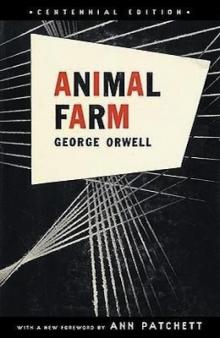 Animal Farm & 1984
Animal Farm & 1984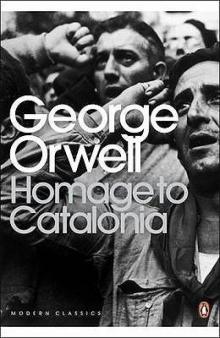 Homage to Catalonia
Homage to Catalonia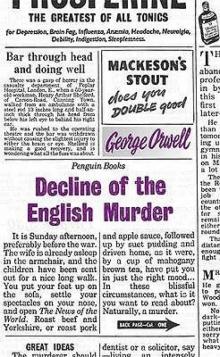 Decline of the English Murder
Decline of the English Murder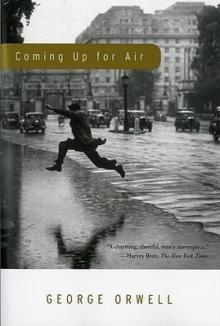 Coming Up for Air
Coming Up for Air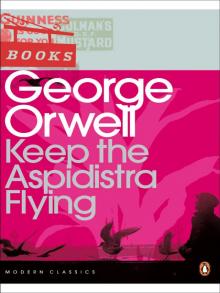 Keep the Aspidistra Flying
Keep the Aspidistra Flying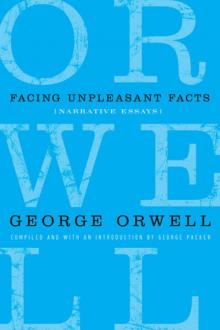 Facing Unpleasant Facts: Narrative Essays
Facing Unpleasant Facts: Narrative Essays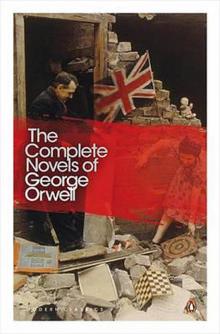 The Complete Novels of George Orwell
The Complete Novels of George Orwell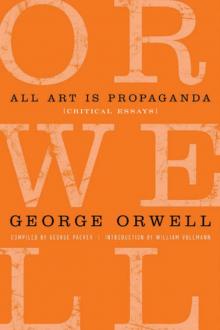 All Art Is Propaganda: Critical Essays
All Art Is Propaganda: Critical Essays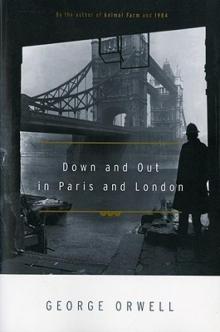 Down and Out in Paris and London
Down and Out in Paris and London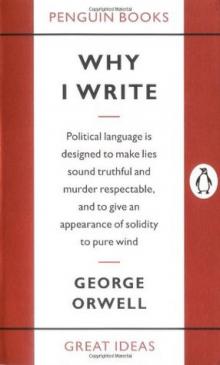 Why I Write
Why I Write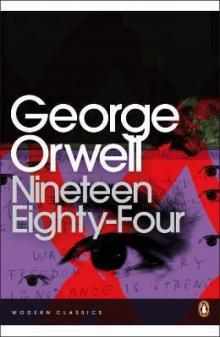 Nineteen Eighty-Four
Nineteen Eighty-Four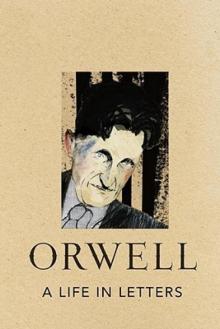 A Life in Letters
A Life in Letters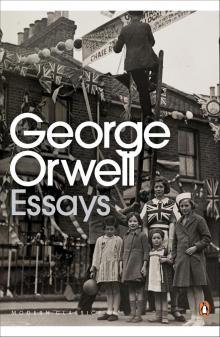 Essays
Essays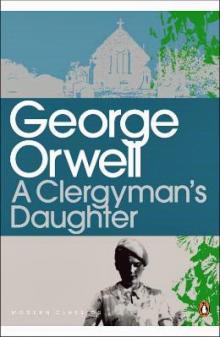 A Clergyman's Daughter
A Clergyman's Daughter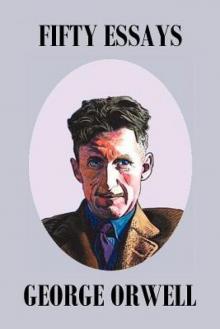 Fifty Orwell Essays
Fifty Orwell Essays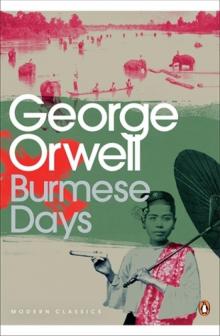 Burmese Days
Burmese Days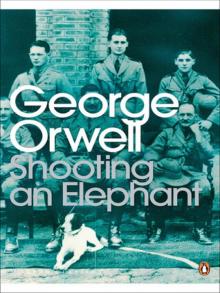 Shooting an Elephant
Shooting an Elephant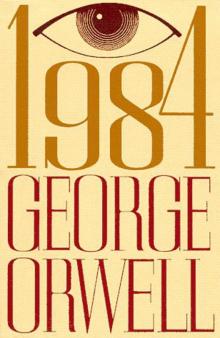 1984 (Penguin)
1984 (Penguin)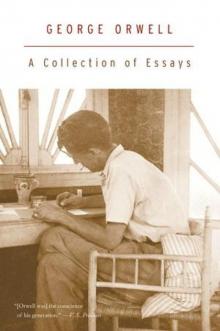 A Collection of Essays
A Collection of Essays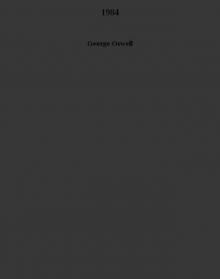 1984
1984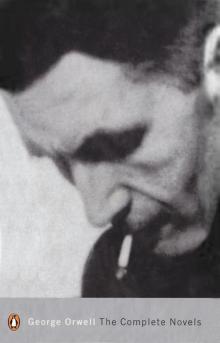 The Complete Novels
The Complete Novels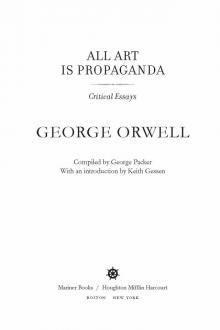 All Art Is Propaganda
All Art Is Propaganda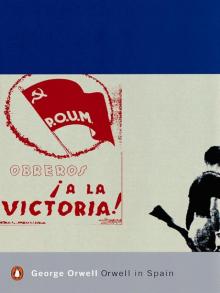 Orwell in Spain
Orwell in Spain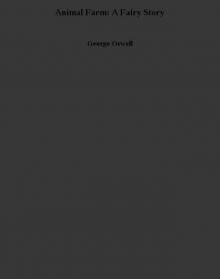 Animal Farm: A Fairy Story
Animal Farm: A Fairy Story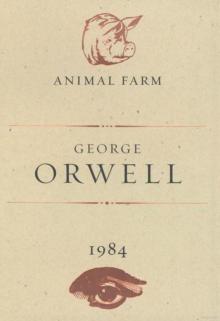 Animal Farm and 1984
Animal Farm and 1984